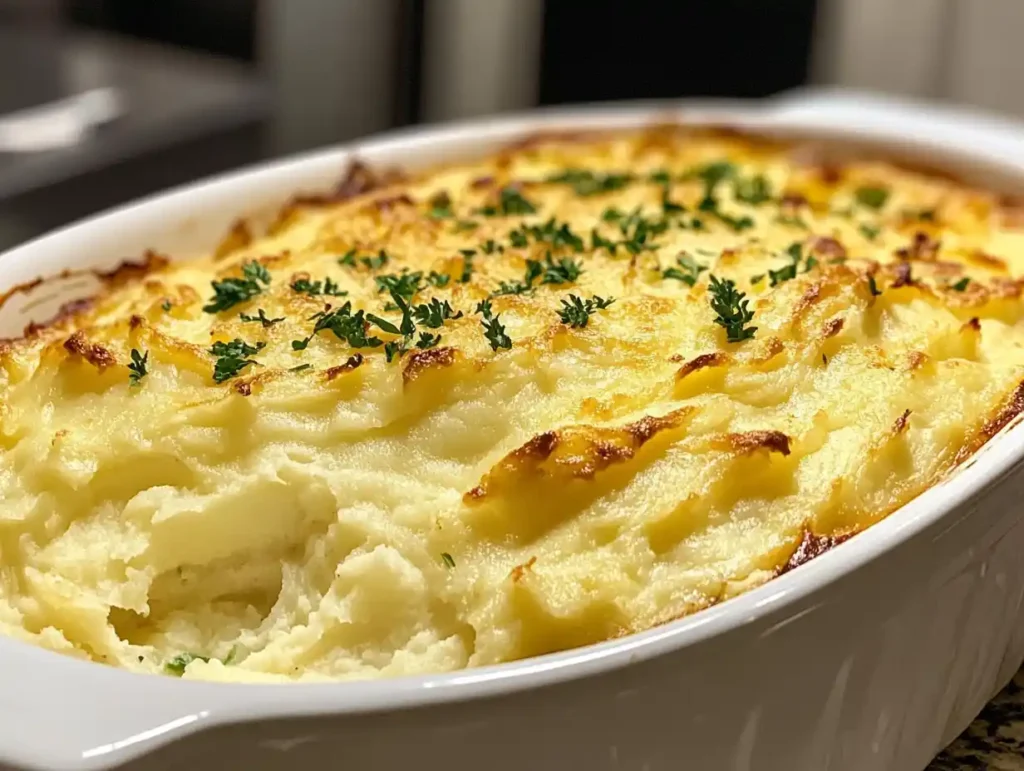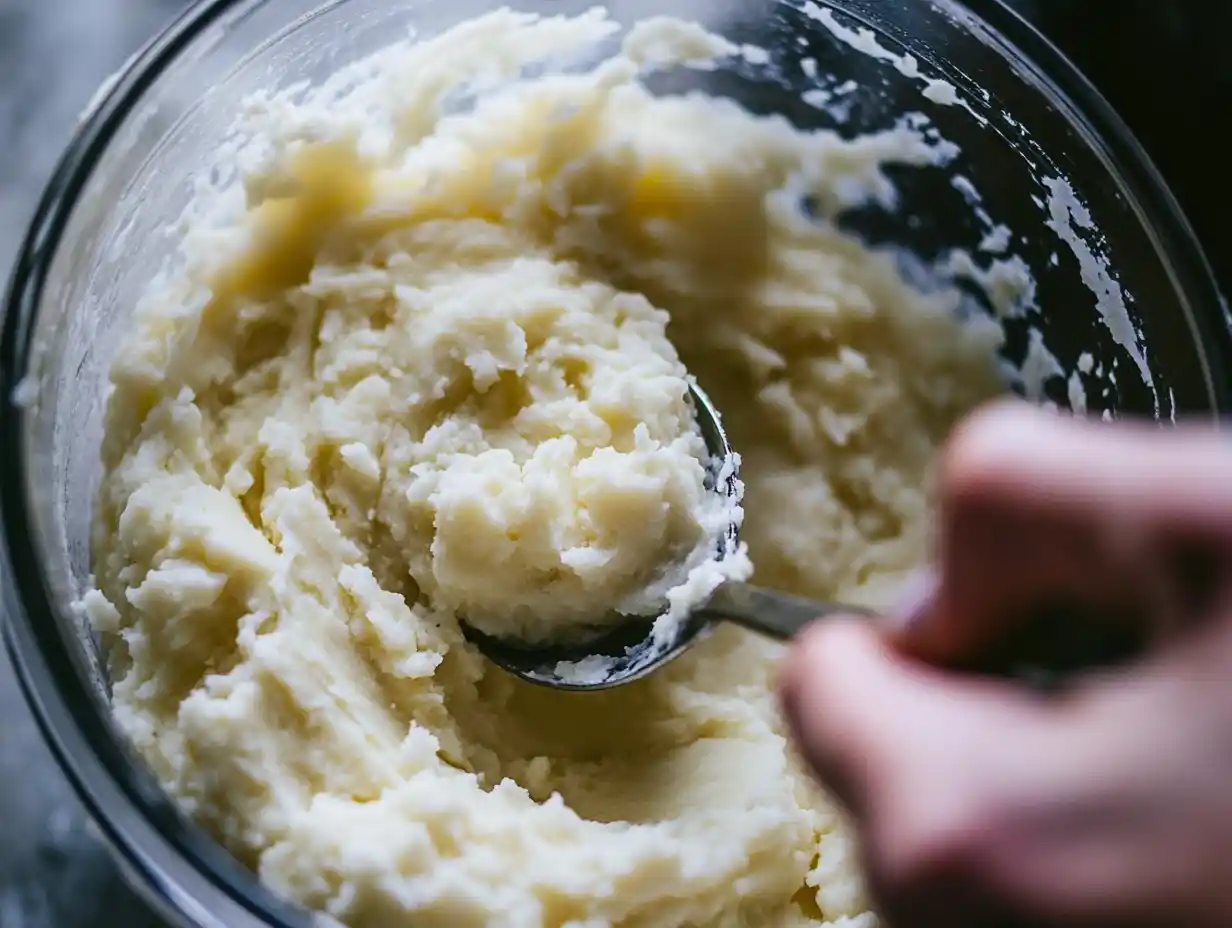Introduction
Mashed potatoes are a classic comfort food enjoyed by many, but what happens when you make too much? Freezing leftover mashed potatoes can be a convenient way to reduce food waste and save time. However, many people wonder—are mashed potatoes good after being frozen?
The short answer is yes, mashed potatoes can be frozen and reheated successfully, but the process requires proper preparation and storage methods to maintain their creamy texture and rich flavor. In this article, we’ll explore whether mashed potatoes taste good after freezing, how to freeze and reheat them properly, and tips to keep them fresh and delicious.
Can Mashed Potatoes Be Frozen?
Is It Safe to Freeze Mashed Potatoes?
Yes, it is completely safe to freeze mashed potatoes as long as they are stored correctly. Mashed potatoes contain ingredients like butter, milk, and cream, which help them freeze better by preserving moisture and flavor. Proper storage prevents bacterial growth and freezer burn, ensuring the dish remains safe to eat for months.
How Freezing Affects Texture and Flavor
While freezing mashed potatoes is safe, it can impact their texture. Potatoes have a high water content, and freezing can cause ice crystals to form, leading to a grainy or watery consistency when thawed. However, this can be fixed with proper reheating techniques and by adding ingredients like cream or butter to restore their smooth texture.
How to Properly Freeze Mashed Potatoes
Freezing mashed potatoes the right way is key to preserving their flavor and texture. Let’s dive into the best methods to prepare and store mashed potatoes for freezing success.
Preparing Mashed Potatoes for Freezing
- Cool Completely Before Freezing – Allow your mashed potatoes to cool to room temperature. Freezing warm potatoes can lead to condensation, causing freezer burn.
- Add Extra Fat – Incorporate extra butter or cream before freezing. Fat helps maintain a creamy texture after thawing by preventing the potatoes from becoming dry or grainy.
- Portion Sizes – Divide mashed potatoes into smaller, meal-sized portions to make reheating easier and faster.
Ideal Containers for Storage
- Airtight Containers – These are perfect for preventing air exposure and freezer burn.
- Freezer Bags – Flatten the mashed potatoes in freezer bags to save space and make thawing quicker.
- Plastic Wrap and Foil Layers – For added protection, wrap the potatoes tightly in plastic wrap before placing them in containers or bags.
Freezing Methods and Tips
- Flash Freezing – Scoop mashed potatoes into small mounds on a baking sheet, freeze until solid, then transfer to freezer bags. This method allows you to use only the amount you need.
- Label and Date – Always label containers with the freezing date to keep track of freshness. Mashed potatoes can last up to 2–3 months in the freezer.
- Avoid Overcrowding the Freezer – Ensure there’s enough airflow around containers for even freezing.
How to Thaw Frozen Mashed Potatoes
Safe Thawing Techniques
- Refrigerator Method – Transfer the frozen mashed potatoes to the fridge and let them thaw slowly overnight. This method helps preserve their texture.
- Microwave Method – Use the defrost setting if you’re short on time, but stir frequently to ensure even thawing.
- Stovetop Method – Place the frozen potatoes in a saucepan on low heat. Stir occasionally to prevent sticking and add a splash of milk or cream to restore moisture.
Best Practices for Reheating
- Microwave – Heat in short intervals, stirring in between to avoid uneven heating.
- Oven – Cover the potatoes with foil and bake at 350°F (175°C) for about 20–30 minutes.
- Stovetop – Stir over medium-low heat, adding milk or butter as needed to keep them creamy.
Reheating frozen mashed potatoes might slightly alter their consistency, but with a little effort, they can taste just as good as freshly made ones.
Do Mashed Potatoes Taste Good After Freezing?

Texture and Flavor Preservation
Frozen mashed potatoes generally retain their flavor well, thanks to the butter and cream content that prevents flavor loss. However, the texture can sometimes become a bit grainy or watery. To fix this:
- Add warm milk, cream, or butter during reheating.
- Whip or mash the potatoes again to restore smoothness.
Common Issues and How to Fix Them
- Grainy Texture – Use an electric mixer to whip the potatoes until smooth.
- Dryness – Stir in additional liquid like broth, milk, or cream during reheating.
- Loss of Flavor – Season with extra salt, pepper, garlic powder, or herbs to boost taste.
Tips to Improve Frozen Mashed Potatoes
Freezing mashed potatoes may slightly affect their texture, but a few simple tricks can help restore their original creaminess and flavor. One effective method is to add moisture during reheating. Warm milk, cream, or melted butter can be mixed into the potatoes as they heat, giving them a smoother texture and richer taste.
Re-whipping or mashing the potatoes is another helpful technique. Using a hand mixer or potato masher can break up any clumps and make the consistency silky again. Adding cheese, sour cream, or even a sprinkle of herbs like chives or parsley can enhance the flavor, making the potatoes taste freshly prepared.
For extra creaminess, you can also add a dollop of cream cheese or a splash of chicken broth. These ingredients work wonders for improving both flavor and moisture content. If the potatoes seem bland after freezing, don’t hesitate to add seasonings such as garlic powder, onion powder, or black pepper.
Storage Duration and Safety Concerns
Mashed potatoes can typically be stored in the freezer for up to 2–3 months without significant changes in quality. After this period, they may still be safe to eat but could develop freezer burn, which affects flavor and texture. For the best results, always use airtight containers or freezer-safe bags to minimize air exposure.
It’s important to label the storage containers with the freezing date to monitor their freshness. When reheating, check for any signs of spoilage, such as an off smell, discoloration, or mold. If you notice any of these issues, it’s safer to discard the potatoes than risk consuming spoiled food.
For those who want to extend the shelf life even further, vacuum-sealing the mashed potatoes before freezing can be a great option. This method eliminates air pockets and reduces the chances of freezer burn.
Best Ingredients for Freezing Success
The ingredients you use in your mashed potatoes can greatly affect how well they freeze and reheat. Creamy ingredients like butter, heavy cream, and cheese make mashed potatoes more freezer-friendly because they help retain moisture. Mashed potatoes made with full-fat dairy products are less likely to become watery or grainy after thawing.
On the other hand, mashed potatoes made with skim milk or water may not freeze as well, leading to a drier and less flavorful result. Ingredients like garlic, sour cream, and cream cheese also hold up well in the freezer, enhancing both texture and taste.
However, it’s best to avoid adding fresh herbs before freezing, as they can lose their flavor and texture during storage. Instead, add herbs and seasonings after reheating for the best flavor.
Alternative Ways to Use Frozen Mashed Potatoes

Frozen mashed potatoes don’t always have to be reheated as a side dish. They can also be repurposed into creative recipes that make the most of their texture.
One popular option is to use them in casseroles. Simply spread a layer of thawed mashed potatoes over cooked meat or vegetables, top with cheese, and bake until golden and bubbly. This approach works particularly well for shepherd’s pie or baked potato casseroles.
Mashed potatoes can also be turned into crispy potato pancakes or croquettes. Mix in an egg, breadcrumbs, and seasonings, then shape the mixture into patties. Fry them in a skillet until golden brown for a delicious appetizer or snack.
For an even simpler use, add thawed mashed potatoes to soups or stews to thicken the broth and add a creamy texture. They can also be used as a filling for stuffed mushrooms or as a topping for baked chicken or fish dishes.
Pros and Cons of Freezing Mashed Potatoes
Freezing mashed potatoes has its advantages and disadvantages. Understanding both can help you decide whether freezing is the right option for preserving your leftovers.
Benefits of Freezing Mashed Potatoes
One of the biggest benefits is convenience. Freezing mashed potatoes allows you to prepare meals in advance, saving time on busy days. They are also a great way to reduce food waste by preserving leftovers that might otherwise be thrown out.
Another advantage is their versatility. Once thawed, mashed potatoes can be used in various dishes, from casseroles to soups, making them a flexible ingredient to keep on hand. Additionally, adding rich ingredients like butter and cream before freezing helps maintain their taste and texture, ensuring they taste just as good as fresh ones.
Drawbacks to Consider
Despite the benefits, there are a few drawbacks to freezing mashed potatoes. The most common issue is a change in texture. Frozen potatoes may develop a slightly grainy or watery consistency after thawing, which requires extra effort to restore.
Another concern is freezer burn, which can occur if mashed potatoes are not stored in airtight containers. Freezer burn leads to dry spots and a loss of flavor, making the potatoes less appetizing.
Additionally, freezing mashed potatoes with low-fat ingredients may result in a dry and unappealing texture, as fat is essential for preserving moisture. For this reason, recipes made with skim milk or no butter might not freeze as well.
FAQs About Freezing Mashed Potatoes
Can You Freeze Mashed Potatoes with Milk or Cream?
Yes, mashed potatoes made with milk or cream freeze very well. The added fat helps preserve moisture and prevents the potatoes from becoming dry or crumbly after thawing.
Do Mashed Potatoes Lose Nutrients After Freezing?
Freezing mashed potatoes does not significantly affect their nutritional value. However, reheating them at very high temperatures for extended periods may lead to some nutrient loss.
How Do You Prevent Freezer Burn?
To prevent freezer burn, store mashed potatoes in airtight containers or freezer-safe bags. Make sure to remove as much air as possible before sealing the containers. Label them with the date to track freshness.
Can You Freeze Mashed Sweet Potatoes?
Yes, mashed sweet potatoes freeze even better than regular mashed potatoes because of their naturally higher sugar content, which helps preserve their texture and flavor.
How Do You Tell If Frozen Mashed Potatoes Have Gone Bad?
Signs of spoilage include a sour or off smell, discoloration, or the presence of mold. If you notice any of these, discard the mashed potatoes immediately.
Is It Better to Freeze Mashed Potatoes with or Without Seasoning?
It’s generally better to freeze mashed potatoes with light seasoning. Salt and butter enhance preservation, but fresh herbs should be added after reheating for better flavor.
Conclusion
So, are mashed potatoes good after being frozen? The answer is a resounding yes—with the right preparation and storage techniques, mashed potatoes can be frozen and reheated while retaining much of their original flavor and texture. Adding extra fat, sealing them properly, and reheating them carefully can make a big difference in their quality.
Frozen mashed potatoes are not only a time-saving option but also a versatile ingredient for a variety of recipes, from casseroles to soups. While there may be minor changes in texture, these can easily be fixed with a few simple tricks.
Whether you’re meal-prepping for busy days or saving leftovers, freezing mashed potatoes is a smart and practical solution for reducing food waste without sacrificing flavor.
Looking for more insights about frozen foods? Check out our guide on how to cook meatballs from frozen and explore tips for improving the taste of store-bought frozen meatballs. For potato lovers, don’t miss our article on frozen mashed potatoes for more freezing tips!

